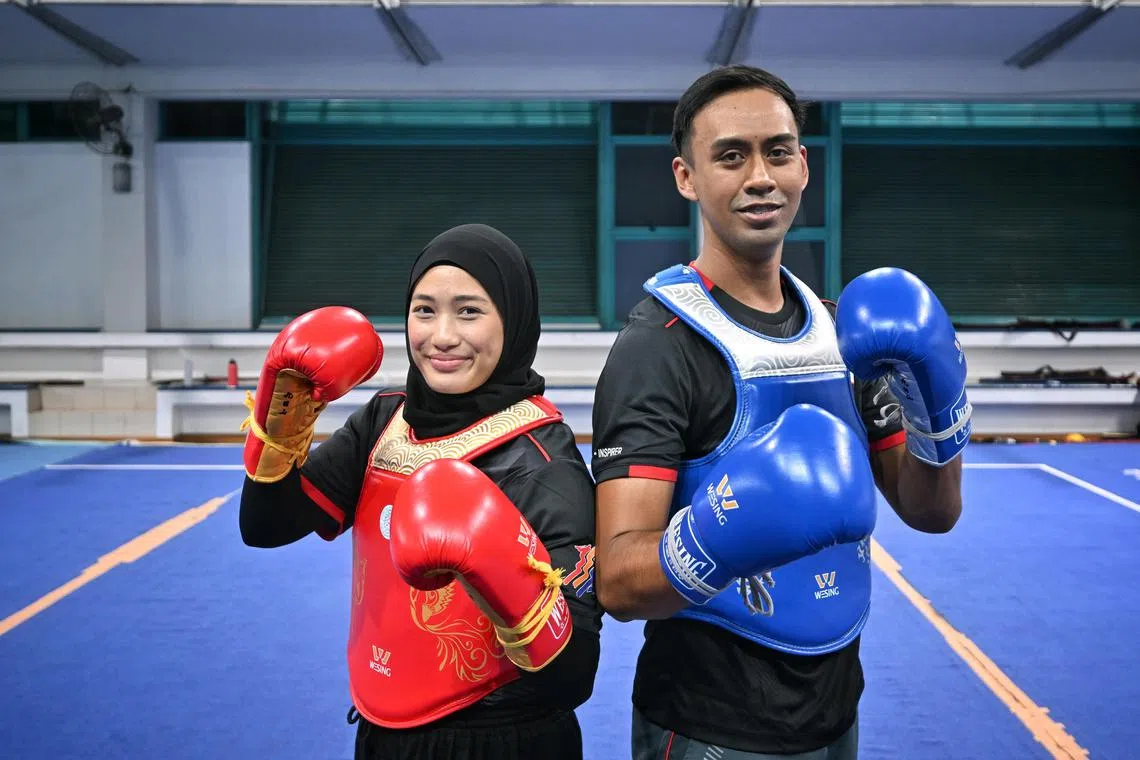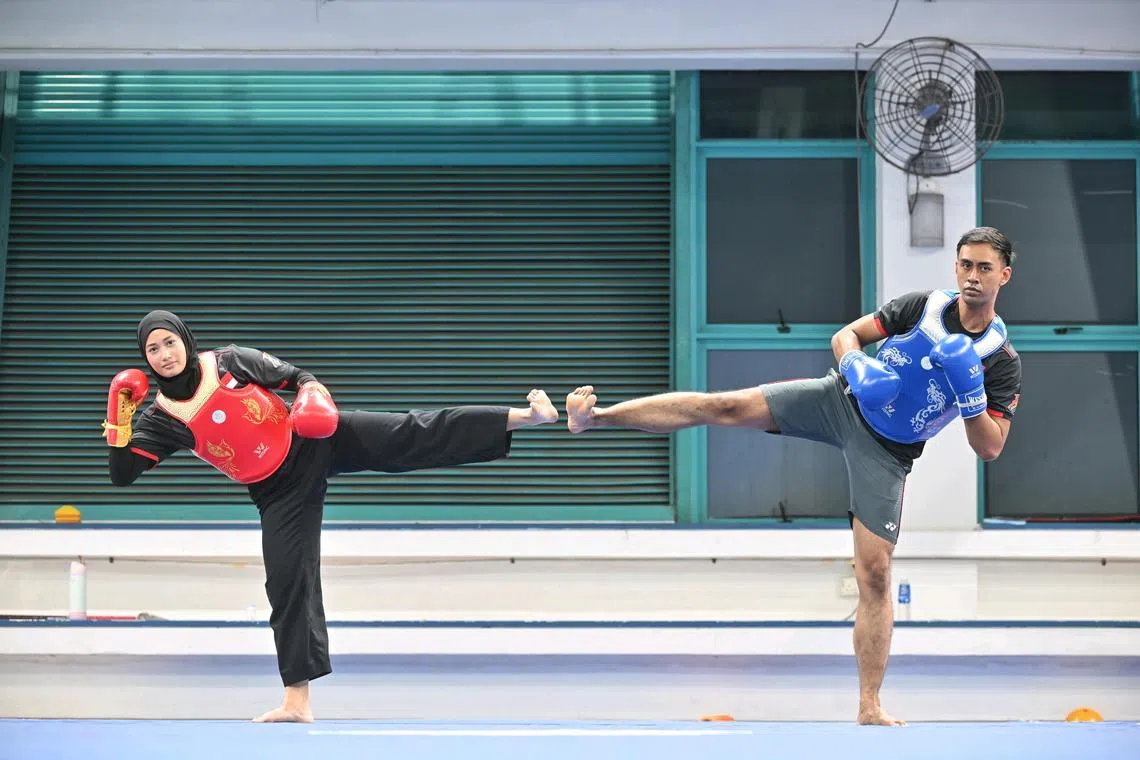From silat to wushu, Singapore athletes make the switch for the SEA Games
Sign up now: Get the biggest sports news in your inbox

Silat athletes Siti Khadijah (left) and Adib Farhan Ramli will be representing Singapore in wushu at the SEA Games in Thailand in December.
ST PHOTO: ARIFFIN JAMAR
Follow topic:
- Siti Khadijah and Adib Farhan switched from silat to wushu after SEA Games selection setbacks.
- Sport Singapore's cross-combat sports strategy programme enabled their transition, recognising transferable skills and opening new competitive pathways.
- They are Singapore's first non-Chinese wushu sanda athletes in a major event
AI generated
SINGAPORE – The sport of silat has brought joy, and heartbreak, to Siti Khadijah Shahrem.
Since picking it up at 11, she has won medals at the SEA and Asian Games, and earned a Sportswoman of the Year nomination for the 2023 Singapore Sports Awards.
But in 2025, the 24-year-old hit a low when she missed out on selection for the SEA Games.
With only the women’s Class B (50-55kg) and Class C (55-60kg) categories contested in Thailand, Khadijah – who won a bronze at the 2022 Games in Class F (70-75kg) and competed in Class D (60-65kg) at the last edition – decided to cut weight to contest in Class C.
Though she managed to make weight, she fell short at Singapore Silat Federation’s (SSF) internal selection trials in March – 18-year-old Rifqah Mursyidah Mistam earned the spot instead.
It was a crushing blow for Khadijah, who was determined to compete at her third consecutive SEA Games.
“I cried because I was disappointed and frustrated, I put in so much work to bring my weight down,” said Khadijah.
Just when it seemed like her dream was over, wushu came calling.
National silat coach Rafili Ramli asked if she would be interested in taking up wushu sanda for the SEA Games. The Chinese martial art of wushu comprises two forms: Taolu is the performance of choreographed routines, while sanda is a full-contact combat sport.
Despite it being a different and Chinese-dominated sport, Khadijah said yes almost immediately.
She said: “It started with having to find out about the collaboration between silat and wushu and the idea that any fighter can be fighting in any kind of rings. Having the opportunity to represent the country for the SEA Games despite not representing silat, I’m thankful.”
It was a similar story for former Asian champion Adib Farhan Ramli, 27, who also made the switch from silat to wushu after missing out on selection for the Games.
Along with teammate Zhong Yuhan, 18, the duo will be Singapore’s first athletes in wushu sanda at the SEA Games since 2015, with Games debutant Adib and Khadijah the first non-Chinese wushu sanda athletes to compete at the biennial Games.
Adib said: “When coach Rafili told me about this opportunity, immediately I told him to sign me up. I was so excited. The SEA Games is a very rare opportunity, and it’s a dream for every athlete to take part in it.”
The switch for the two athletes, who began training in sanda in August, is a result of a new cross-combat sports strategy programme introduced by Sport Singapore’s High Performance Sport Institute.
Its chief Su Chun Wei noted that it “represents an innovative approach to maximising athlete potential by recognising and harnessing the transferable skills that exist across combat disciplines”.
In June 2024, a combat sport centre was set up at the Bedok Sports Hall to support the programme.
Dr Su added that the pilot programme between the Singapore Wushu Dragon & Lion Dance Federation (SWDLDF) and SSF has shown early signs of success.
He said: “Later that month, they competed in an invitational match alongside Team Singapore wushu athletes against SEA Games-level exponents. The match not only affirmed both athletes’ potential at the regional level but also provided data points for their SEA Games 2025 qualification.”
“The two silat athletes’ ability to acquire sanda techniques within this relatively short timeframe underscores the transferability of skills across different combat sports, opening up new competitive pathways for Team Singapore athletes,” he added.
As they were new to wushu, Adib said there were initial quizzical looks when he turned up at the training centre, but he was quickly welcomed.
Khadijah added: “I thought I would feel strange in a foreign arena, because I’ve been in silat almost my whole life, but I’m glad that the first time I entered the sanda ring... I felt welcomed.”

Siti Khadijah (left) and Adib Farhan Ramli will be representing Singapore in wushu at the SEA Games in Thailand in December.
ST PHOTO: ARIFFIN JAMAR
SWDLDF president Ang Mong Seng said that Singapore’s return to the sanda event is “particularly significant” and the federation welcomes greater diversity across all its programmes as it strengthens the talent pool and embodies Singapore’s inclusive sporting values.
Ang added that while they have been developing the national sanda programme for the past decade, the limited number of international competitions has restricted opportunities for the sanda athletes to gain experience.
He said: “While there are key differences, both silat and wushu sanda share similar combat approaches, striking techniques and tactical elements. Our assessment shows that silat athletes have strong condition and combat readiness, enabling them to quickly adapt to wushu sanda rules while maintaining safety standards.”
A key difference that both athletes had to get used to was being struck in the head.
In silat (tanding), athletes are not allowed to exert physical force on any part of their opponents’ neck, head, and lower abdominal area from the navel to the groin. In sanda, where competitors wear headgear and gloves, punches and kicks to the front and side of the head are permitted, although there are prohibited areas such as the eyes, throat, or back of the head.
Khadijah had to first ask her mother for her blessing, as she knew the latter would be concerned for her safety. The silat athlete also admitted that she flinched the first time she received a blow to her face during a training session.
Having traded their black silat outfit for different gear that includes gloves and a head protector, Adib and Khadijah are looking forward to the Dec 9-20 Games.
For Adib, who shared that his friends had reacted with disbelief and laughter when he first made the switch, the journey is just beginning.
He added: “I fell in love with the sport because of the culture and how they respect each other. The reason why I want to pursue sanda is that I want to break the stigma. Just because a sport contains one race, it does not mean that we as a minority cannot be successful in that sport, too.”


